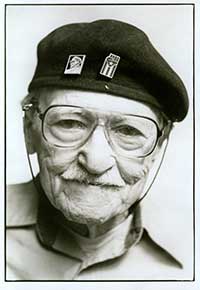Aaron Moss
a militant anti-imperialist into his 90s
By
Mike Eilenfeldt
New York
Published Jan 11, 2008 11:35 PM
Dr. Aaron Moss died of pneumonia on Dec. 23 at the impressive age of 98. Moss
had been a close friend of Workers World Party since the late 1980s, when he
began attending meetings with his son, Jerry Moss.
Aaron Moss considered WWP’s founding leader, Sam Marcy, to be a great
Marxist-Leninist. Moss visited the Soviet Union, Poland, East Germany, North
Korea, Spain and Mexico and made many trips to Cuba. He spoke Spanish fluently
and joined with members of WWP on the first Pastors for Peace Friendshipment
Caravan to Cuba in 1991, despite threats from the U.S. government to punish the
comrades with heavy fines and expensive court battles.
Moss was a strong supporter of the Cuban Revolution, especially during the
“special period” of economic and political crises triggered by the
fall of the Soviet Union. He appreciated the great sacrifices that Cuba has
made to deliver high-quality medical care to every citizen, despite the
genocidal U.S. blockade.
Moss was a fervent anti-imperialist Marxist who thought of the WWP as his
family. Each year on his birthday, he came to the meeting of the New York
branch to make a generous financial contribution to the party and was honored
in return. He attended numerous anti-war mobilizations and rallies and
supported the Palestinian resistance.
Every year from 1998 until his death, he supported the annual National Day of
Mourning action organized by the United American Indians of New England and
helped pay for buses to Plymouth, Mass., where the event was held. Although
nearly 90 at the time, he traveled to Puerto Rico in 2000 in solidarity with
the people of Vieques, who were demanding that the U.S. Navy cease its practice
bombing runs there and get off the island.
Moss’s parents were Polish working class immigrants. Later in life he was
able to discuss with his friends about how he and five siblings had grown up in
a harshly abusive family environment.
He graduated from New York University in 1933, the depths of the Depression,
with a degree in dental medicine and began his first practice in his
mother’s living room in Newark, N.J. During this period Moss joined the
Communist Party; he remained a loyal member until the mid 1940s.
Jerry Moss recalls the day in 1945 when both his parents broke down in tears at
the news that President Franklin D. Roosevelt, a liberal Democrat whose
presidency had encompassed both the Depression and World War II, had died. He
also recalls that his father raised him not to accept the racist poison
prevalent in capitalist culture.
Moss never gave up his socialist ideals, even when he was overwhelmed by inner
conflicts and needed to leave the CPUSA, his marriage and his profession to
face them. He became an early authority on the use of hypnotism in dentistry,
wrote the first book on the subject and toured the country giving lectures.
His interest in hypnotism stimulated a curiosity about his own unconscious
mind. After years of frustrating attempts to overcome emotional illness with
the aid of psychoanalysts, Moss abandoned the conventional life to embark on an
odyssey that led him to Mexico and Spain in the 1960s. In this period of social
and personal rebellion and turmoil, he became a suicidal escape artist, an
atheist-rabbi, a self-styled hippie guru and an experimenter with various
substances, to mention only a few of his adventures.
He also earned a PhD in psychology at the University of Malaga in Spain.
Thousands of hours of self-analysis formed the basis for him to develop a
self-help six-step method of analyzing dreams, combined with free association,
to gain insights into the relationship between behavior, conscious thought and
the unknown. The six-step method is outlined in his book “Self-Analysis
for the Analyst.” It explained his view that people are slaves to their
unconscious minds, yet have the ability to change their behavior through
sustained, systematic analysis that yields insights which otherwise would be
beyond their reach.
The expatriate Dr. Moss returned to his home country in 1975 and took up
residence in Manhattan to work as a therapist in his new field of analytic
psychology. His friend Tibby Brooks jokes that Aaron nearly missed the boat as
an activist. In 1982 the 72-year-old Moss was at first ambivalent about joining
her Greenwich Village Peace Council. But he admired Brooks and she was able to
persuade him to disregard his age and other problems for the sake of the
anti-nuclear movement.
Always one to act on his beliefs, Moss even in his nineties traveled to Nevada
to participate in a demonstration against nuclear testing.
Articles copyright 1995-2012 Workers World.
Verbatim copying and distribution of this entire article is permitted in any medium without royalty provided this notice is preserved.
Workers World, 55 W. 17 St., NY, NY 10011
Email:
[email protected]
Subscribe
[email protected]
Support independent news
DONATE


